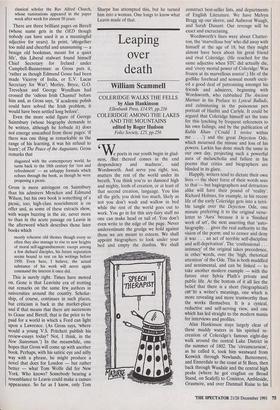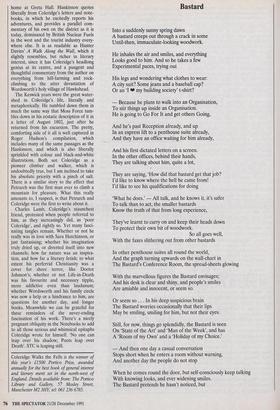Leaping over death
William Scammell
We poets in our youth begin in glad- ness, But thereof comes in the end despondency and madness', said Wordsworth. And serve you right, too, mutters the rest of the world under its breath. You think you're so damned high and mighty, lords of creation, or at least of that second creation, language. You kiss all the girls, you drink too much, likely as not you don't wash and wallow in bed while the rest of the world goes out to work. You go in for this airy-fairy stuff no one can make head or tail of. You don't even write to the edge of the page. Never underestimate the grudge we hold against those we are meant to esteem. We shall appoint biographers to look under your bed and empty the dustbin. We shall construct best-seller lists, and departments of English Literature. We have Melvyn Bragg up our sleeve, and Auberon Waugh, and Sarah Dunant. Our revenge will be exact and excruciating.
Wordsworth's lines were about Chatter- ton, the 'marvellous boy' who did away with himself at the age of 18, but they might almost have been about his great friend and rival Coleridge. (He reached for the same adjective when STC did actually die, and 'every mortal power of Coleridge/ Was frozen at its marvellous source'.) He of the godlike forehead and sensual mouth excit- ed a good deal of patronising amongst his friends and admirers, beginning with Wordsworth, who rubbished The Ancient Mariner in his Preface to Lyrical Ballads, and culminating in the poisonous pen portrait of Hazlitt and Carlyle. It could be argued that Coleridge himself set the tone for this lynching by frequent references to his own failings, and by the publication of Kubla Khan (`Could I revive within me . . .') and the great Dejection Ode, which mourned the misuse and loss of his powers. Larkin has done much the same in our own day, projecting such a powerful aura of melancholia and failure in his poems that critics and biographers are blinded in its glare.
Happily, writers tend to dictate their own lives — the sheer force of their words sees to that but hagiographers and detractors alike will have their pound of 'reality'. Richard Holmes, for example, in his recent life of the early Coleridge gets into a terri- ble tangle over the Dejection Ode, one minute preferring it to the original verse- letter to `Asra' because it is a 'finished work of art', the next asserting that 'auto- biography. . . gives the real authority to the vision of the poem; and to censor and deny it was . . . an act of terrible self-discipline and self-deprivation'. The 'confessional . • intimacy' of the original takes precedence, in other lords, over the 'high, rhetorical attention' of the Ode. This is both muddled and sentimental, and can be linked — to take another modern example — with the furore over Sylvia Plath's private and public life. At the bottom of it all lies the belief that there is a short (biographical) clirto a writer's meanings, one which is more revealing and more trustworthy than the works themselves. It is a cynical, reductive and self-serving view, and one which has led straight to the modern mania for interviews and profiles.
Alan Hankinson stays largely clear of these muddy waters in his spirited re- creation of Coleridge's famous eight-day walk around the central Lake District in the summer of 1802. The `circumcursion', as he called it, took him westward from Keswick through Newlands, Buttermere, and Ennerdale to the coast at St Bees, then back through Wasdale and the central high peaks (where he got cragfast on Broad Stand, on Scafell) to Coniston, Ambleside, Grasmere, and over Dunmail Raise to his home at Greta Hall. Hankinson quotes liberally from Coleridge's letters and note- books, in which he excitedly reports his adventures, and provides a parallel com- mentary of his own on the district as it is today, dominated by British Nuclear Fuels in the west and the tourist industry every- where else. It is as readable as Hunter Davies' A Walk Along the Wall, which it slightly resembles, but richer in literary interest, since it has Coleridge's headlong genius at its centre, and a pungent and thoughtful commentary from the author on everything from hill-farming and rock- climbing to the utter devastation of Wordsworth's holy village of Hawkshead.
The Keswick years were the great water- shed in Coleridge's life, literally and metaphorically. He tumbled down them in much the same way that Moss Force tum- bles down in his ecstatic description of it in a letter of August 1802, just after he returned from his excursion. The pretty, comforting side of it all is well captured in Roger Hudson's compilation, which includes many of the same passages as the Hankinson, and which is also liberally sprinkled with colour and black-and-white illustrations. Both see Coleridge as a pioneer climber and walker, which is undoubtedly true, but I am inclined to take his absolute priority with a pinch of salt. There is a similar story to the effect that Petrarch was the first man ever to climb a mountain for pleasure. What this really amounts to, I suspect, is that Petrarch and Coleridge were the first to write about it.
Charles Lamb, Coleridge's staunchest friend, protested when people referred to him, as they increasingly did, as 'poor Coleridge', and rightly so. Yet many fasci- nating tangles remain. Whether or not he really was in love with Sara Hutchinson, or just fantasising; whether his imagination truly dried up, or diverted itself into new channels; how far nature was an inspira- tion, and how far a literary fetish; to what extent his perfervid Christianity was a cover for sheer terror, like Doctor Johnson's; whether or not Life-in-Death was his favourite and necessary tipple, more addictive even than laudanum; whether Wordsworth and his family circle was now a help or a hindrance to him, are questions for another day, and longer books. Meanwhile we can be grateful for these reminders of the never-ending fascination of his work. There's a nicely pregnant obliquity in the Notebooks to add to all those serious and whimsical epitaphs Coleridge wrote for himself. 'No one can leap over his shadow; Poets leap over Death'. STC is leaping still.
Coleridge Walks the Fells is the winner of this year's £1500 Portico Prize, awarded annually for the best book of general interest and literary merit set in the north-west of England. Details available from: The Portico Library and Gallery, 57 Mosley Street, Manchester M2 3HY, tel: 061 236 6785.











































































































 Previous page
Previous page